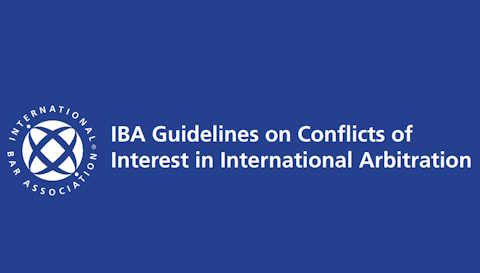
- “The ABA Center for Professional Responsibility Working Group on ABA Model Rule of Professional Conduct 5.5 (MRPC 5.5) is requesting public comment on an Issues Paper it developed regarding possible regulatory implications associated with exploring possible amendments to MRPC 5.5 to increase permissible cross-border practice.”
- “‘Since the last large-scale review of ABA MRPC 5.5 (Unauthorized Practice of Law; Multijurisdictional Practice of Law), technology, globalized legal practice, and client expectations regarding the delivery of legal services have continued to evolve.'”
- “‘In light of these developments, as described further below [in the Issues Paper], questions have arisen as to whether Model Rule 5.5 remains fit for purpose, or whether the reality of 21st-century legal practice and delivery of legal services merits changes to the current manner in which multijurisdictional practice is permitted.'”
“New Guidelines on Conflicts of Interest in International Arbitration”
- “The Arbitration Committee of the International Bar Association has published revised Guidelines on Conflicts of Interest in International Arbitration (“IBA Guidelines“). The new text modernizes the previous version of the Guidelines (2014) without fundamentally amending them and will continue to be widely applied in all types of arbitrations (commercial, investment, sports, maritime, etc.).”
- “First published in 2004, the IBA Guidelines have become a widely accepted instrument reflecting international standards of impartiality and independence of arbitrators.”
- “Some of the most relevant amendments to the general standards in Part One of the Guidelines:
- Arbitrator’s disclosure impeded by secrecy rules: the new General Standard 3(e) calls on arbitrators not to accept an appointment or resign if the arbitrator considers that he or she should make a disclosure, but that professional secrecy rules or other rules of practice or professional conduct prevent such disclosure.
- Failure to disclose: the new General Standard 3(g) expressly recognizes that a failure to disclose certain circumstances does not necessarily mean that a conflict of interest exists;
- Parties’ due diligence obligation: General Standard 4(a) includes a presumption that a party shall have learned of any fact or circumstance which a reasonable enquiry would have yielded if conducted at the outset of or during the proceedings and waived the right to raise an objection based on that fact or circumstances if not raised within 30 days.
- Relationship between the arbitrator and the arbitrator’s law firm or employer: the text of General Standard 6 – in particular the concept of “law firm” – has been modernized to reflect the evolution in the structure and mode of international legal practice.”
- “The following additions to the orange list are the amendments which are most relevant in practice.
- Experts: arbitrator currently serves, or has acted within the past three years, as an expert for one of the parties or an affiliate of one of the parties in an unrelated matter (Item 3.1.6), or has, within the past three years, been appointed as an expert on more than three occasions by the same counsel, or the same law firm (Item 3.2.9). At the same time, it is clarified that the arbitrator, when acting as arbitrator in another matter, heard testimony from an expert in the current proceedings constitutes a Green List Item (Item 4.5.1).
- Co-arbitrators: arbitrator and counsel for one of the parties currently serve together as arbitrators in another arbitration (Item 3.2.12), or an arbitrator and their fellow arbitrator(s) currently serve together as arbitrators in another arbitration (Item 3.2.13).
- Relationship between arbitrator and expert: arbitrator is instructing an expert appearing in the arbitration proceedings for another matter where the arbitrator acts as counsel (Item 3.4.3).
- Mock trials: arbitrator appointed by one of the parties to assist in mock-trials or hearing preparations on two or more occasions within the past three years (Item 3.2.10).
- Publicly advocating an opinion on the case: the 2024 version of the Guidelines clarifies that this orange list situation includes advocating an opinion through social media or on-line professional networking platforms (Item 3.4.2).”
For more, here’s a redlined version:“IBA GUIDELINES ON CONFLICTS OF INTEREST IN INTERNATIONAL ARBITRATION
(COMPARE 2014 AND 2024 VERSIONS)”
